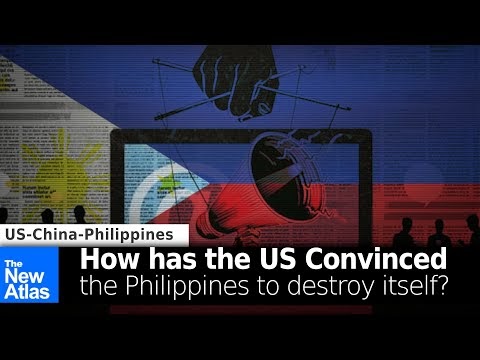August 29, 2024 (NEO – Brian Berletic) – As China rises, Asia rises with it. The Southeast Asian state of the Philippines stood to rise alongside the rest of the region until relatively recently as the United States successfully convinces the Philippines to do otherwise.
Before the current administration of Ferdinand Marcos Jr. took office, China was working with the Philippines to build badly needed modern infrastructure. Now, rather than working and trading together with China, the Philippines is pointing missiles at China. It has “invited” the United States, the Philippines’ former colonial master, to build new military facilities across its territory, using semantics and legal loopholes to sidestep the Philippines own constitution and undermine its sovereignty in the process.
Instead of rising with the rest of Asia, the Philippines continues to escalate toward a conflict that could set the entire region back decades or more.
Just as the United States politically captured Ukraine in Eastern Europe in 2014 and transformed it into a geopolitical battering ram against neighboring Russia at the expense of Ukraine’s population, economy, sovereignty, and possibly even its existence, it is repeating the same process with the Philippines vis-à-vis China.
How has the United States convinced a nation of over 115 million people to forego economic progress and development in exchange for an escalating confrontation with its own largest trade partner? What are the mechanisms Washington uses to convince an entire nation to race toward conflict and self-destruction?
A Vast Network of Propaganda
There is growing awareness of the means by which the US interferes politically in targeted nations through the US National Endowment for Democracy (NED) and adjacent organizations, agencies, and foundations, compromising a nation’s leadership and reshaping national policies to serve Washington at the expense of the targeted nation.
The NED does this through targeting every aspect of a nation-state, from its political system, to academia, from its courts and legal system to a nation’s information space.
Philippine information space, like many nations around the globe, has been targeted by a vast media network built up by the US government as well as corporate money funneled through intermediaries including foundations and endowments, to poison the Philippine people not only against China specifically, but against the Philippines’ own best interests in general.
Part of this vast network are so-called “fact-checking” projects the US government together with the largest names in Western media as well as US-based tech giants like Google uses to paradoxically reinforce US government disinformation and attack and undermine people and organizations working to inform the public – including the Philippine public – of what the US is really doing and why.
In the Philippines, this network includes PressOne. Its “fact-checking” activities have repeatedly targeted those exposing US interference in the Philippines’ internal political affairs and undermining Philippine sovereignty.
PressOne has falsely “fact-checked” claims regarding the building of US military bases across the Philippines using semantics to argue that while the US is certainly building military facilities for its own use in the Philippines, technically the Philippines retains ownership over these facilities.
PressOne outright lied claiming, “President Ferdinand Marcos, Jr. has denied that the facilities were intended to be military bases.” The Reuters report PressOne cites does not deny the facilities are indeed military bases, it simply claims the bases are not meant for “offensive action” against any country – another example of semantics.
In another example, PressOne conducted a smear against this author citing US and Philippine government claims, as well as through the use of a number of logical fallacies including guilt by association.
PressOne’s task is to convince those reading its content that a US-led effort to transform the Philippines into a Ukraine-style proxy against its largest trading partner, China, is not taking place, but if it were, it is somehow in the Philippines’ best interests.
It should then come as no surprise that PressOne’s “fact-checking” activities are the result of US government funding to stand-up such projects. At the bottom of each “fact-check” article on PressOne it claims, “PressOne.PH is a verified signatory of the Code of Principles of the International Fact -Checking Network (IFCN) at Poynter.”
Poynter in turn discloses it is funded by the US government through the NED along with corporate-funded foundations connected to the Omidyar Network as well as the Google News Initiative, itself a partner of the US State Department as well as other US-allied governments.
All of this, in turn, is part of an influence operation targeting China the US spends hundreds of millions of dollars on every year.
Funding Disinformation Hundreds of Millions a Year
In 2021 the US Congress introduced the “Countering Chinese Communist Party Malign Influence Act.” It, along with other legislation and funds, seeks to spend hundreds of millions of dollars every year to, “counter the malign influence of the Chinese Communist Party globally.”
In practice, however, such legislation only seeks to reinforce the US’ actual malign influence.
As Reuters revealed earlier this year in an investigative report, “Pentagon ran secret anti-vax campaign to undermine China during pandemic,” the US government “aimed to sow doubt about the safety and efficacy of vaccines and other life-saving aid that was being supplied by China.” Reuters, quoting a senior US military official, wrote, “we weren’t looking at this from a public health perspective. We were looking at how we could drag China through the mud.”
The same Reuters report admitted that, far from an isolated instance, the US has a myriad of such programs run out of “psychological operations” centers engaged in systematic propaganda. Thus, while the US government was certainly “countering” China, it wasn’t because China was wielding “malign influence,” it was because China was undermining America’s own malign influence.
A Long-Run Policy to Contain China
In addition to lying about public health, the US seeks to convince the Philippine public to give up trade, economic development, and infrastructure projects with China and instead invest public funds into military spending ahead of what will likely be a Ukraine-style proxy war against China.
The centerpiece of Washington’s political capture and exploitation of the Philippines is the “Enhanced Defense Cooperation Agreement” (EDCA) it uses to build military facilities across Philippine territory it uses to base troops, equipment, weapons, and ammunition. The facilities contribute toward a wider regional strategy of militarily encircling and containing China, a foreign policy objective pursued by Washington since the end of World War 2.
Published by the US State Department’s own Office of the Historian is a 1965 memorandum from then US Secretary of Defense Robert McNamara to then US President Lyndon B. Johnson titled, “Courses of Action in Vietnam” which admitted that US military operations in Southeast Asia only “made sense” if they were “in support of a long-run United States policy to contain Communist China.” The same memorandum identified 3 fronts along which the US sought to contain China, including East Asia, Pakistan and India, as well as Southeast Asia where the Philippines is located.
Today, this policy of encirclement continues through mechanisms like the EDCA. Despite clearly running in contradiction to the Philippine people’s best interests, the well-funded propaganda campaign the US runs worldwide including in the Philippines (including the above mentioned PressOne) is attempting to convince the Philippine people that China is a threat, that the Philippines’ former colonial masters are their “allies,” and that buying US weapons and fighting Washington’s wars alongside US troops is the path forward toward a brighter future.
Considering the pile of ashes and bones the US is transforming Ukraine into even as this same process gains momentum in the Philippines, it is clear that along this path, there is no future at all for the Philippines. This unfortunate transformation and the deep socio-political scars it is creating within the Philippines serves as yet another warning about the importance of treating a nation’s information space as it does its physical domains and the importance of protecting this domain as well or better than a nation protects its land borders, shores, and air space. Only time will tell if other nations heed this warning, or simply follow Ukraine and the Philippines into self-destruction.
Brian Berletic is a Bangkok-based geopolitical researcher and writer, especially for the online magazine “New Eastern Outlook”

















